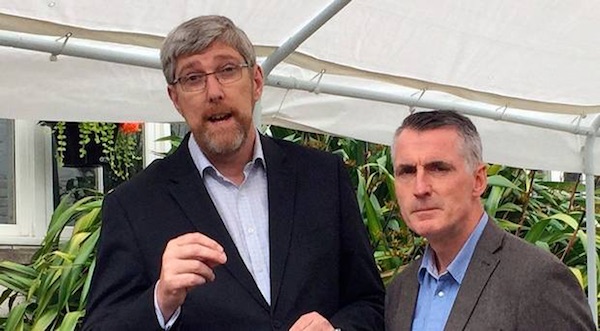
Despite a sudden flurry of activity, the Stormont talks passed through another British-imposed deadline on Thursday, the fourth this year.
Talks are supposed to be continuing despite the passage of the deadline. The British Direct Ruler James Brokenshire is likely to set a new deadline on Monday when he makes a statement at Westminster.
Delays caused by the Westminster general election and the DUP’s wrangling over its support role for the new British government had ensured that the goal of an agreement to restore the power-sharing Assembly in Belfast could not be met.
But that did not prevent the usual media scrum at Stormont as government officials sought to inject momentum into a talks effort deeply contaminated by the British government and the DUP’s announcement of a government pact at Westminster.
All the signs had been negative in recent days but, if anything, relationships between the DUP and Sinn Fein seemed to decline further. Sinn Fein’s goal of implementing the outstanding agreements suffered as an emboldened DUP became more intransigent than ever.
There have been suggestions that Brokenshire, who had threatened to return the north of Ireland to full Direct Rule from London, might postpone further talks until after the Protestant marching season, when unionist political extremism reaches a crescendo.
However, many observers believe the DUP’s new-found access to power and money at Westminster has fatally undermined its interest in the power-sharing institutions in Belfast.
In particular, few believe the DUP will accept an Irish language act, intended to protect the rights of Irish speakers in the North, in the short term. Reports indicate it has attempted to lower the status of the Irish language by linking it with the locally spoken dialect known as Ulster-Scots.
This week former DUP leader Peter Robinson repeated his party’s claims that Tony Blair had “conned” Sinn Fein when an Irish language act was included in the 2006 St Andrews Agreement, and that there had never been any intention to implement it.
He claimed his predecessor, Ian Paisley, had been “intensely displeased” by the British government’s privately stated intention to ignore the measure.
“(Ian) was unhappy about the government’s deception of Sinn Fein and was concerned that, when Sinn Fein realised they had been conned, problems would arise,” he wrote.
Former Sinn Fein culture minister Caral Ni Chuilin said the two governments, along with all the parties at St Andrews, agreed to the inclusion of an Irish language act.
“Sinn Fein wants to see that agreement implemented,” she said. “Peter Robinson spent nine years as first minister blocking an Irish language act, an Irish language strategy and an Ulster Scots strategy,” she said.
Meanwhile, unanswered questions over the ‘Renewable Heat Incentive’ (RHI) scandal, in which the DUP is deeply implicated, is also understood to be discouraging that party from supporting a return of Stormont. Investigations at the Assembly could result in criminal prosecutions over the spending of up to 500 million pounds on a bogus green energy scheme, and DUP Ministers including party leader Arlene Foster will want to bury the matter.
Issues surrounding Foster’s role in the RHI scandal, or Brexit, have not featured as major sticking points with Sinn Fein. It said this week it was the DUP’s refusal to move on “the basic rights” which had collapsed the Executive.
Party chairperson Declan Kearney (pictured, right) warned that the DUP have still not moved: “They haven’t moved on ending the denial of rights to Irish speakers,” he said. “They haven’t moved on ending the denial of rights to the LGBT community. They haven’t moved on honouring the commitment to a Bill of Rights.”
In her statements, Caral Ni Chuilin added that a failure to introduce anti-sectarian measures and issues relating to the legacy of conflict were also obstacles. But she noted her party was ready to return to Stormont if agreement was reached.
“Sinn Fein remains committed to securing credible political institutions, which have equality and respect at their core,” she said.
DUP negotiator Edwin Poots said his party was willing to restore Stormont immediately, but he warned said Sinn Fein would not be rewarded for bringing down the political institutions in Belfast.
“If anybody thinks they are going to collapse Stormont, get all of their demands and go back in there then they may think again because that is not the way we do business,” he said.
Poots also reacted angrily to perceived “interference” from the Dublin government when it called for the implementation of an Irish language act. With more than a hint of irony, the DUP said it was seeking a meeting with 26 County foreign affairs minister Simon Coveney over what it said was the Dublin government’s failure to be “neutral” in the talks.
‘STEP CHANGE NEEDED’
Following the talks failure, Sinn Fein called on 26 County Taoiseach Leo Varadkar and British PM Theresa May to directly intervene.
“We will stay here as long as there is a glimmer of hope that there will be success in these talks, but we are realists and we are experienced negotiators and we know there needs to be a step change in these talks,” said SF negotiator John O’Dowd (pictured, left).
The British government needed to remove their partisan approach, and set aside their relationship with the DUP if the talks are to succeed, he said.
“We are calling on the Taoiseach and the British prime minister to become directly involved in these talks as a matter of urgency,” he said.
The 1 billion pound Tory-DUP pact had “emboldened” and “entrenched” the position of the DUP in regard to all the matters that needed to be resolved, he said, and the two governments needed to bring leadership to the talks.
“They need to bring the strength of a government and of governments to these talks, and urge the DUP that outstanding agreements have to be implemented if we are to move forward to a stable Executive in the weeks and months ahead.”
![[Irish Republican News]](https://republican-news.org/graphics/title_gifs/rn.gif)
![[Irish Republican News]](https://republican-news.org/graphics/title_gifs/harp.gif)

